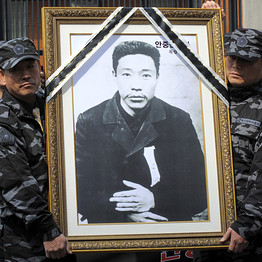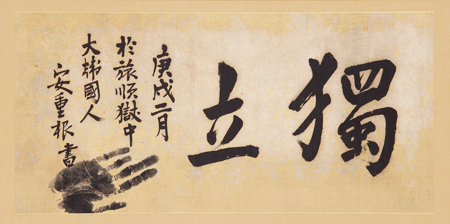t_co
Senior Member
- Joined
- Dec 20, 2012
- Messages
- 2,538
- Likes
- 709
Korea, China Find Common Ground Against Japan With Monument of Korean Hero Ahn Jung Geun in Harbin - China Real Time Report - WSJ
Together, China and Korea hold nearly 300bn USD in Japanese government bonds. Abenomics is also weakening. If Japan continues its intransigence on territorial and historical issues, China and Korea can team up to dismantle the ability for Japan to finance its national debt right when Japan's recovery is most fragile.History quite literally shapes the present in northeast Asia, where leaders refuse to let the past rest in peace as they tap into this infinite source of conflict—so much so that Japan seems unable to escape the diplomatic quagmire it's in with China and South Korea.

South Korean army veterans hold a portrait of Korean independence fighter Ahn Jung-Geun during a rally marking the 100th anniversary of his death outside the Japanese embassy in Seoul in 2010.
Agence France-Presse/Getty Images
But while the source of the current strain between Japan and its neighbors tends to be territorial rows or about mid-20th century aggression by the imperial army and how current Japanese leaders continue to offend, Seoul and Beijing have recently decided to go further back in time to denounce Japan, possibly driving the schism deeper between Asia's top economic powerhouses.
On Monday, South Korean President Park Geun-hye thanked a visiting senior Chinese official for the progress made for a monument in China's northeastern city of Harbin commemorating the 1909 assassination of Hirobumi Ito, who presided over the Korean Peninsula as governor when it was a colonial protectorate of Japan's.
President Park expressed gratitude toward China's state councilor Yang Jiechi for the monument dedicated to Ahn Jung Geun, who shot and killed Ito. While the Japanese regard Ito, who also served as the nation's first prime minister, as one of the founding fathers of modern Japan, Koreans view the assassination as a brave act of resistance against imperial Japan, which annexed Korea in 1910. The incident took place on a train platform in Harbin.
Ahn, who was executed by Japanese authorities in 1910 for the murder, is a national hero in South Korea, where he is seen as an independence fighter. He remains a controversial figure for Seoul-Tokyo relations. A soccer match between the two countries in July received international attention for anti-Japanese banners held by South Korean fans, including one with Ahn's picture.
The idea to build a memorial originated from Ms. Park, who made the unusual request to Chinese President Xi Jinping during her Beijing visit in June. Japanese Prime Minister Shinzo Abe has yet to hold talks with either leader since taking office in December—a diplomatic anomaly.
"We consider Ahn Jung Geun to be a criminal," Japan's Chief Cabinet spokesman Yoshihide Suga said Tuesday. He called the development "not favorable for Japan-South Korea relations."
Seoul made a robust response to Mr. Suga's comments.
"It's deeply regrettable to use the term 'criminal' in referring to national hero Ahn Jung Geun, who sacrificed his life for national independence and peace in the Orient," South Korean Foreign Ministry spokesman Cho Tai-young said at a briefing.
Ironically, Ms. Park, days before her meeting to share her delight with the Chinese statesman over the anti-Japan monument, called for the three countries to publish a joint history book to overcome their endless disputes.
"There may come a day when the wall of historical issues, which has been a source of conflict and distrust in the region, will be torn down," Ms. Park said.

